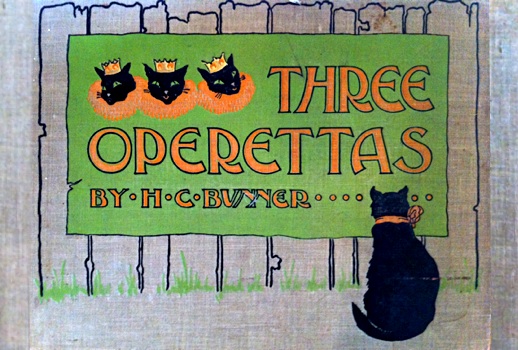
Style is key. High style. You can sing grand opera in a generic, international grand opera manner, and fudge the specifics with an endearingly foreign-sounding trill … or, at least, you could. Operetta is lighter than opera, without those great gooey passions; instead, there are skin-deep flirtations and lots more dance steps. The craze lingered, from waltz-time to the foxtrot to the tango to jazz.
Why is operetta’s sophisticated spirit now so elusive, so difficult to resuscitate? Is it merely the extinction of chic, of elegant euphemism in an age of single-entendres? Why is the good stuff no longer commercial? Lehar and Kalman made regular leaps to Broadway, joining Friml, Romberg, Victor Herbert, Noel Coward, Fritz Loewe, Bernstein, Sondheim—what are Kismet, Camelot, Candide, Little Night Music if not operettas? Oh, they send up operetta, but—who didn’t?
More to the point: Hardly anyone with commercial clout studies singing any more. They depend upon microphones and they ornament emotion by hacking and choking—just as artificial but far less pretty. You have to have operatic training (which all Broadway and Hollywood singers used to acquire) for the melodies of operetta to bloom. Sing it with half a voice and a mic, and the blooms droop and rot on the vine.
Students of operatic technique, whose voices may not be mature enough for full-scale operatic shout, may do justice to operetta. They will learn how to express character in a wink and a pout and a pointed syllable. They will practice their languages. They will not damage youthful vocal equipment. The ladies may have ankles worth noticing. The men may actually reach the high notes, as operetta tenors in Vienna and Budapest never do nowadays.
This (I’m guessing) was the thought Steven Blier, Kapellmeister of the New York Festival of Song, who teaches at the Juilliard School’s Marcus Institute for the Vocal Arts. On Wednesday at Tully Hall, he and co-pianist Michael Barrett played bits of nineteen shows, both well known and undeservedly obscure, for nine singers in the program. Jean Slater choreographed in jazzy fashion and Mary Birnbaum staged the soignée interactions.
They were all game, they could all sing, and in four languages. Traditions were upheld: Boys sang to (or about) girls, girls to (or about) boys. (This suggests one way the form could update itself.) One rather edgy number from Kalman’s Zigeunerprimas concerned a baritone (Davone Tines, a fine, dark sound) torn between yearning for a woman and the love of his violin, which he played between couplets.
Only one of the mezzos had to play a boy, Virginie Verrez, who possessed the most obviously operatic instrument but didn’t allow vocal glamour to obstruct her French accent in full-throated bits from Chabrier’s L’Etoile—or her sophisticated shrug in Moises Simons’ “C’est ça l’amour”). Three of the boys appeared in drag, sort of, in scenes from Gilbert & Sullivan’s lovely, neglected Princess Ida—Kyle Bielfield, Miles Mykkanen and Philip Stoddard, teasing the Ida of Raquel Gonzalez. Nathan Haller and Rachael Wilson made, for my money, the most romantic couple of the night in “April Snow” from Romberg’s Up In Central Park.
Simone Easthope not merely sang “The Amorous Goldfish” from Sidney Jones’s The Geisha, she credibly impersonated one—a goldfish, that is—a goldfish with a sizable operatic soprano. Ms. Easthope, a natural comedienne, has the dramatic range for operetta, becoming serious and intent for the passion of Caballero’s “Yo Quiero a un Hombre.” Mr. Bielfield sang Paris’s yodeling song from Offenbach’s La Belle Hélène with the proper sexy insouciance.
Mr. Mykkanen sang Kern’s “There Isn’t One Girl in the World” with a sigh in his liquid tenor. Ms. Wilson and Mr. Stoddard sang of Old Broadway auf Deutsch in a duet from Kalman’s Die Herzogin von Chicago. For those bored with love (at an operetta?), Mr. Bielfield and Mr. Tines came melodiously to threats if not blows in a macho duet from a Sorozabal zarzuela, and Mr. Tines led (or fled—both at once, evidently) a band of Peruvian guerillas in Sousa’s El Capitan. Mr. Stoddard played a rajah from Messager’s L’Amour masqué, but what rajah wears a mask in Paris unless love is on his mind? Ms. Wilson sounded far more passionate than dovelike in the “Cancion de Paloma” from El barberillo de Lavapies.
Everyone played “chorus” or amorous object or rejected suitor to everybody else’s turns in the sun. Everyone could twitch a rear end with panache. Warm feelings swept the house.
The diction from all hands was excellent except in the finale, Sondheim’s nearly inevitable “Weekend in the Country.” You had to know the words to understand them. True, we all do know them by now, but operatic voices have a real problem projecting Sondheim’s corkscrew rhymes.
Now let me tell you about my operetta, Die Markgräfin von Milvaukee (The Marquisa from Milwaukee). It’s terribly relevant, really. Mercedes, Princess of Lamsy-Divey, a tropical paradise somewhere in East Central Europe, is terribly depressed (financially) by the failure of the oat harvest and the euro crisis. Her tiny nation’s only hope is a local boy who has become a timber millionaire in Wisconsin…


